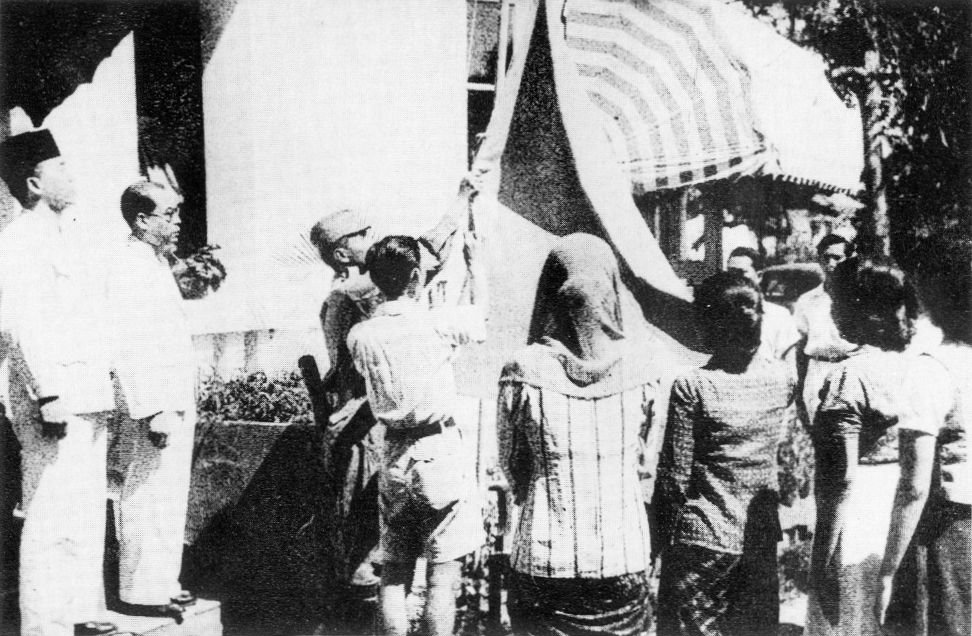|
Toko (shop)
A ''toko'' ( Indonesian for shop) is a kind of retail shop in Indonesia and the Netherlands. The term is of Indonesian origin and probably from the Chinese Hokkien loanword to refer to a shop. In Indonesia, the term ''toko'' is used as a generic name for any kind of established shop or store. For example, in Indonesia, ''toko roti'' means a bakery while a ''toko kelontong'' sells daily necessities. In the Netherlands, the meaning has shifted more specifically to refer to Asian shops and takeaway restaurants, which sell mainly Asian food products of which the owners are generally Indo, Native Indonesian, Surinamese, Chinese, or Vietnamese. History ''Tokos'' as a place of commerce emerged in present-day Indonesia during the Dutch East Indies era, where many shophouses (''rumah toko'' in Indonesian) were run by local Chinese sellers in major cities such as Batavia. Tokos have become a common type of shop in Dutch cities since the repatriation of Dutch colonial expats and I ... [...More Info...] [...Related Items...] OR: [Wikipedia] [Google] [Baidu] |
Commerce
Commerce is the organized Complex system, system of activities, functions, procedures and institutions that directly or indirectly contribute to the smooth, unhindered large-scale exchange (distribution through Financial transaction, transactional processes) of goods and services, goods, services, and other things of value at the right time, place, quantity, Quality (business), quality and price through various Distribution (marketing)#Channels and intermediaries, channels among the original Economic production, producers and the final consumers within local, regional, national or international economies. The diversity in the distribution of natural resources, differences of human needs and wants, and division of labour along with comparative advantage are the principal factors that give rise to commercial exchanges. Commerce consists of trade and aids to trade (i.e. auxiliary commercial services) taking place along the entire supply chain. Trade is the exchange of goods (includi ... [...More Info...] [...Related Items...] OR: [Wikipedia] [Google] [Baidu] |
Food Retailers
Food is any substance consumed by an organism for nutritional support. Food is usually of plant, animal, or fungal origin and contains essential nutrients such as carbohydrates, fats, proteins, vitamins, or minerals. The substance is ingested by an organism and assimilated by the organism's cells to provide energy, maintain life, or stimulate growth. Different species of animals have different feeding behaviours that satisfy the needs of their metabolisms and have evolved to fill a specific ecological niche within specific geographical contexts. Omnivorous humans are highly adaptable and have adapted to obtaining food in many different ecosystems. Humans generally use cooking to prepare food for consumption. The majority of the food energy required is supplied by the industrial food industry, which produces food through intensive agriculture and distributes it through complex food processing and food distribution systems. This system of conventional agriculture relies he ... [...More Info...] [...Related Items...] OR: [Wikipedia] [Google] [Baidu] |
Sari-sari Store
A sari-sari store, anglicized as neighborhood sundry store, is a convenience store found in the Philippines. The word ''sari-sari'' is Tagalog meaning "variety" or "sundry". Such stores occupy an important economic and social location in a Filipino community and are ubiquitous in neighborhoods and along streets. Sari-sari stores tend to be family-run and privately owned operating within the shopkeeper's residence. Commodities are displayed in a large screen-covered or metal-barred window in front of the shop. Candies in recycled jars, canned goods, and cigarettes are displayed while cooking oil, salt, and sugar are stored at the back of the shop. Prepaid mobile phone credits are provided. The sari-sari store operates with a small revolving fund, and it generally does not offer perishable goods requiring refrigeration. The few that do have refrigerators carry soft drinks, beers, and bottled water. Economic value Sari-sari stores play a vital role in the Philippine econ ... [...More Info...] [...Related Items...] OR: [Wikipedia] [Google] [Baidu] |
Warung
A warung ( old spelling: waroeng or warong) is a type of small family-owned business — small retail, eatery, or café — in Indonesia. A ''warung'' is an essential part of daily life in Indonesia. Over time, the term ''warung'' has shifted somewhat — especially among foreign visitors, expatriates, and people abroad — to refer more specifically to a modest Indonesian eatery or a place that sells Indonesian retail items (mostly groceries or foodstuff). But for the majority of Indonesians, it still refers to a small, neighborhood convenience shop, often a front room or booth in a family's home. There are tourist-serving establishments on the island of Bali and elsewhere that attach the term ''warung'' to their business to indicate their Indonesian nature. Traditionally, ''warung'' is indeed a family-owned business, run by the family members, mostly by women. Traditional warungs are made from wood, bamboo, or woven thatch. More permanent warungs are stalls made from ... [...More Info...] [...Related Items...] OR: [Wikipedia] [Google] [Baidu] |
Asian Supermarket
In non-Asian countries, an Asian supermarket largely describes a category of grocery stores that focuses and stocks items and products imported from countries located in the Far East (e.g. East Asia, East, Southeast Asia, Southeast and South Asia). These stores go further than a typical quintessential supermarket in that they sell general merchandise, goods, and services related to specific Asian countries of origin, immigrant communities or the ethnic enclave that the store may be located in. They would also often tend to diversify by carrying products from other fellow Asian countries; Japan, Japanese supermarkets would carry some China, Chinese, Indonesia, Indonesian, Korea, Korean and Singapore, Singaporean products; Korean supermarkets carry some Chinese and Japanese products; Taiwanese supermarkets carry Chinese, Korean, Japanese, Thailand, Thai, Vietnam, Vietnamese products, and so on. Overview Asian supermarkets carry items and ingredients generally well-suited for Asia ... [...More Info...] [...Related Items...] OR: [Wikipedia] [Google] [Baidu] |
Encyclopedia
An encyclopedia is a reference work or compendium providing summaries of knowledge, either general or special, in a particular field or discipline. Encyclopedias are divided into article (publishing), articles or entries that are arranged Alphabetical order, alphabetically by article name or by thematic categories, or else are hyperlinked and searchable. Encyclopedia entries are longer and more detailed than those in most dictionary, dictionaries. Generally speaking, encyclopedia articles focus on ''factual information'' concerning the subject named in the article's title; this is unlike dictionary entries, which focus on Linguistics, linguistic information about words, such as their etymology, meaning, pronunciation, use, and grammar, grammatical forms.Béjoint, Henri (2000)''Modern Lexicography'', pp. 30–31. Oxford University Press. Encyclopedias have existed for around 2,000 years and have evolved considerably during that time as regards language (written in a major inte ... [...More Info...] [...Related Items...] OR: [Wikipedia] [Google] [Baidu] |
Tokopedia
PT Tokopedia is an Indonesian e-commerce company. Tokopedia is a subsidiary of a new holding company called GoTo, following a merger with Gojek on 17 May 2021. It is one of the most visited e-commerce platforms in Indonesia. Tokopedia is one of Indonesia's unicorn companies, alongside Bukalapak, Gojek, OVO, and Traveloka. As of December 2020, Tokopedia claims to have more than 350 million product listings and 42 digital products, and serves over 100 million monthly active users as well as over 9.7 million merchants on its platform. History William Tanuwijaya and Leontinus Alpha Edison came up with the idea for Tokopedia in 2007. While reflecting on his childhood experience, Tanuwijaya realized that access to products such as books differed between small towns and big cities, and that technology could provide better access to products. The duo launched Tokopedia two years later with starting capital from an acquaintance. Toko is Indonesian for "shop", and is the first hal ... [...More Info...] [...Related Items...] OR: [Wikipedia] [Google] [Baidu] |
Dutch Language
Dutch ( ) is a West Germanic languages, West Germanic language of the Indo-European language family, spoken by about 25 million people as a first language and 5 million as a second language and is the List of languages by total number of speakers, third most spoken Germanic language. In Europe, Dutch is the native language of most of the population of the Netherlands and Flanders (which includes 60% of the population of Belgium). "1% of the EU population claims to speak Dutch well enough in order to have a conversation." (page 153). Dutch was one of the official languages of South Africa until 1925, when it was replaced by Afrikaans, a separate but partially Mutual intelligibility, mutually intelligible daughter language of Dutch. Afrikaans, depending on the definition used, may be considered a sister language, spoken, to some degree, by at least 16 million people, mainly in South Africa and Namibia, and evolving from Cape Dutch dialects. In South America, Dutch is the native l ... [...More Info...] [...Related Items...] OR: [Wikipedia] [Google] [Baidu] |
Indonesian National Revolution
The Indonesian National Revolution (), also known as the Indonesian War of Independence (, ), was an armed conflict and diplomatic struggle between the Republic of Indonesia and the Dutch Empire and an internal social revolution during Aftermath of WWII, postwar and Dutch East Indies#World War II and independence, postcolonial Indonesia. It took place between Indonesian Declaration of Independence, Indonesia's declaration of independence in 1945 and the Netherlands' Dutch–Indonesian Round Table Conference, transfer of sovereignty over the Dutch East Indies to the Republic of the United States of Indonesia at the end of 1949. The four-year struggle involved sporadic but bloody armed conflict, internal Indonesian political and communal upheavals, and two major international diplomatic interventions. Dutch military forces (and, for a while, the forces of the World War II Allies, World War II allies) were able to control the major towns, cities and industrial assets in Repu ... [...More Info...] [...Related Items...] OR: [Wikipedia] [Google] [Baidu] |
Batavia, Dutch East Indies
Batavia was the capital of the Dutch East Indies. The area corresponds to present-day Jakarta, Indonesia. Batavia can refer to the city proper or its suburbs and hinterland, the , which included the much larger area of the Residency of Batavia in the present-day Indonesian provinces of Jakarta, Banten and West Java. The founding of Batavia by the Dutch in 1619, on the site of the ruins of History of Jakarta, Jayakarta, led to the establishment of a Dutch colony; Batavia became the center of the Dutch East India Company's trading network in Asia. Monopolies on local produce were augmented by non-indigenous cash crops. To safeguard their commercial interests, the company and the colonial administration absorbed surrounding territory. Batavia is on the north coast of Java, in a sheltered bay, on a land of marshland and hills crisscrossed with canals. The city had two centers: Kota Tua Jakarta, Oud Batavia (the oldest part of the city) and Sawah Besar, Weltevreden (the relatively n ... [...More Info...] [...Related Items...] OR: [Wikipedia] [Google] [Baidu] |
Shophouse
A shophouse is a building type serving both as a residence and a commercial business. It is defined in the dictionary as a building type found in Southeast Asia that is "a shop opening on to the pavement and also used as the owner's residence", and became a commonly used term since the 1950s. Variations of the shophouse may also be found in other parts of Asia; in Southern China, Hong Kong, and Macau, it is found in a building type known as ''Tong lau'', and in towns and cities in Sri Lanka. They stand in a terraced house configuration, often fronted with arcades or colonnades, which present a unique townscape in Southeast Asia, Sri Lanka, and South China. Design and features * Site and plan: Shophouses were a convenient design for urban settlers, providing both a residence and small business venue. Shophouses were often designed to be narrow and deep so that many businesses can be accommodated along a street. Each building's footprint was narrow in width and long in depth ... [...More Info...] [...Related Items...] OR: [Wikipedia] [Google] [Baidu] |






